Vinegar may support blood sugar balance, heart health, and weight management — backed by modern nutrition science.
This natural acidic liquid, known for its tangy flavor, has been used for centuries in cooking, preservation, and wellness traditions. Today, scientific studies continue to uncover how vinegar’s acetic acid, antioxidants, and bioactive compounds support metabolic and overall health.

Understanding the nutritional and physiological effects of vinegar can help you safely incorporate it into a balanced diet — whether for digestive comfort, blood sugar control, or heart wellness. Let’s explore ten science-based benefits and how to use vinegar effectively.
10 Proven Health Benefits of Vinegar (Science-Based)
Vinegar is more than a tangy kitchen staple — it’s a natural source of acetic acid, polyphenols, and beneficial plant compounds that may support overall metabolic, digestive, and heart wellness.
Recent scientific reviews show that incorporating moderate amounts of vinegar into your diet may offer a range of wellness benefits without replacing medical care.
1. Supports Healthy Blood Sugar Levels
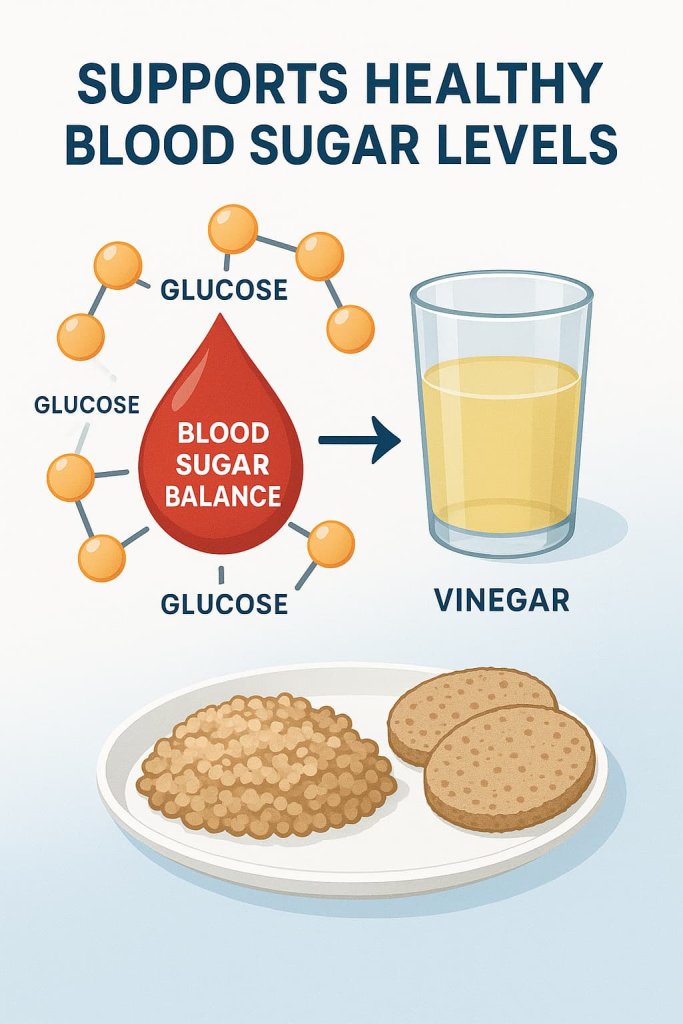
Several clinical studies have found that vinegar may help reduce post-meal blood-sugar spikes by slowing carbohydrate digestion and improving insulin sensitivity.
A 2024 Nutrients meta-analysis reported that adults consuming vinegar with meals experienced lower fasting glucose and HbA1c levels — particularly those with type 2 diabetes or prediabetes.
How it works:
- Acetic acid interferes with starch breakdown in the gut, lowering glucose absorption.
- It slows gastric emptying, helping maintain steadier blood-sugar levels.
- Vinegar may improve insulin response after carbohydrate-rich meals.
According to Harvard Health Publishing, adding 1–2 tablespoons of apple-cider vinegar to a meal may modestly support glycemic control when used alongside a healthy eating pattern.
2. May Aid in Weight Management

Vinegar may support modest weight reduction when paired with balanced nutrition and regular activity.
A randomized controlled trial in the Journal of Functional Foods (2023) found that participants taking 15–30 mL of vinegar daily experienced decreases in body fat and waist circumference over 12 weeks.
Possible mechanisms:
- Promotes satiety and helps reduce calorie intake.
- Supports metabolic rate and fat oxidation.
- Stabilizes blood sugar, which may minimize cravings.
The Mayo Clinic notes that vinegar alone is not a “fat burner,” but it can complement a calorie-controlled diet.
3. Promotes Heart Health
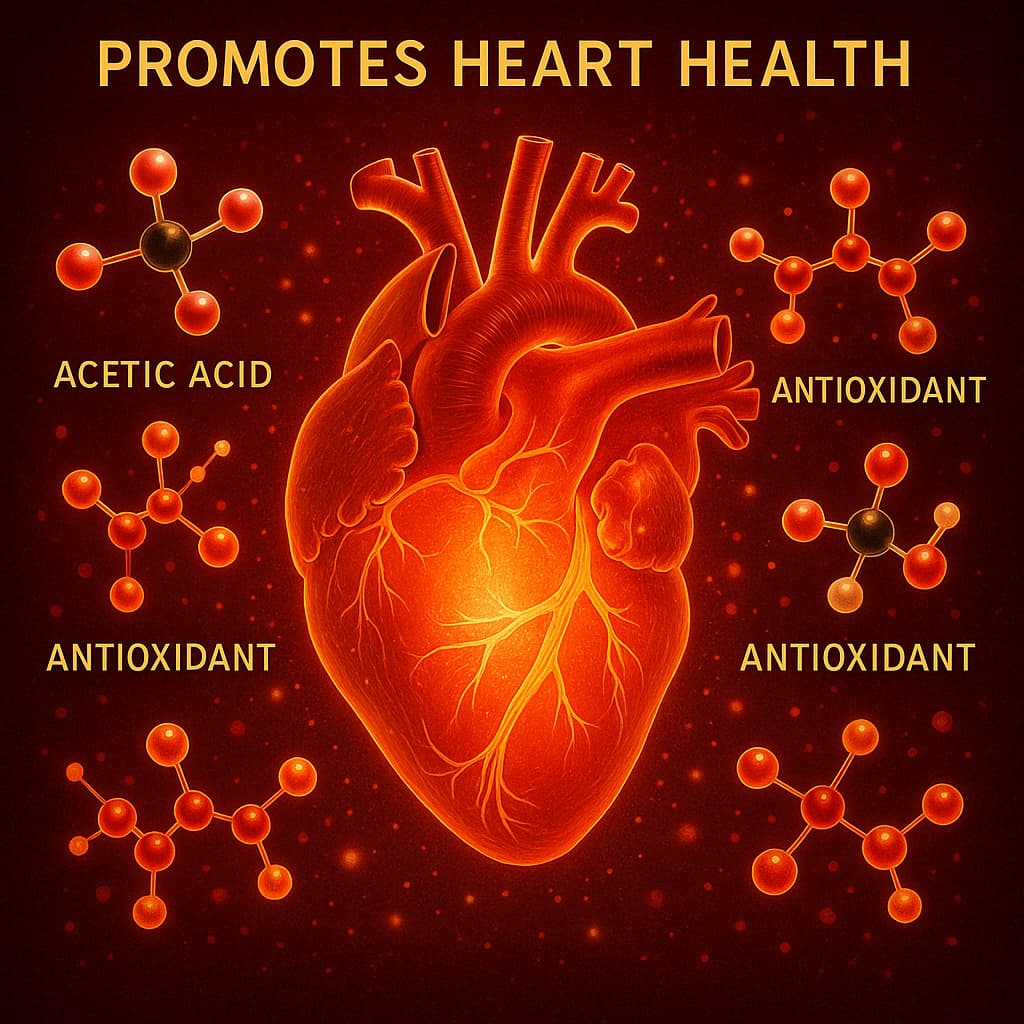
Vinegar’s acetic acid and antioxidant compounds may support cardiovascular function by improving lipid profiles and vascular health.
A 2024 Nutrients review reported that regular vinegar intake was associated with lower total cholesterol and triglycerides in both human and animal trials.
Nutritional insights:
- Contains polyphenols that reduce oxidative stress on arteries.
- May enhance HDL (“good”) cholesterol.
- Supports nitric-oxide activity, aiding blood-vessel flexibility.
The American Heart Association advises using vinegar as a flavorful alternative to high-sodium dressings for heart-friendly meals.
4. Enhances Gut and Digestive Health

Vinegar supports a balanced digestive environment by encouraging beneficial gut bacteria and regulating stomach acidity.
Some human and animal studies show improved microbial diversity and bowel regularity with moderate vinegar use.
How it supports gut wellness:
- Encourages a healthy pH that benefits good bacteria.
- May suppress growth of harmful microbes.
- Stimulates mild digestive enzyme activity before meals.
The Harvard T.H. Chan School of Public Health explains that vinegar’s organic acids can enhance digestion when consumed as part of whole-food meals.
5. Provides Antioxidant Protection

Vinegars made from fruits such as apples, grapes, and pomegranates are rich in polyphenols — natural plant antioxidants that help neutralize free radicals.
Regular use may support the body’s defense against oxidative stress and inflammation linked to aging and chronic disease risk.
Antioxidant-rich varieties include:
- Balsamic vinegar (high in grape polyphenols)
- Black vinegar (contains amino acids and melanoidins)
- Apple-cider vinegar with “the mother,” providing enzymes and prebiotics
6. May Support Heart and Metabolic Health
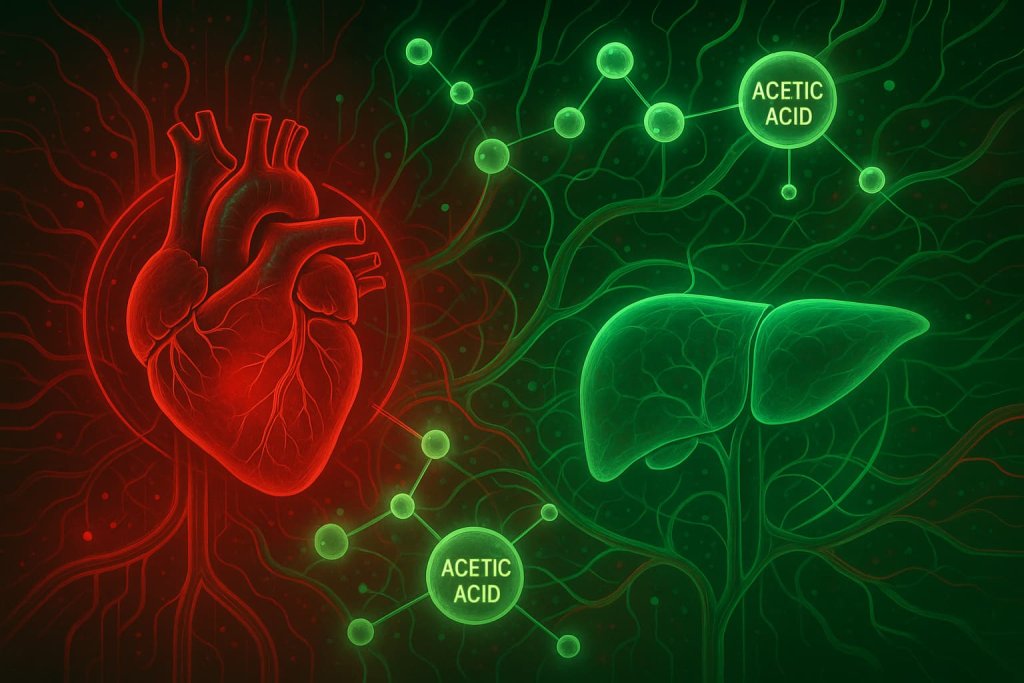
Beyond blood sugar and cholesterol, vinegar may improve broader metabolic markers, including triglyceride levels, waist circumference, and blood pressure.
A 2023 Frontiers in Nutrition meta-analysis found consistent improvements in lipid profiles and body mass index among adults with metabolic syndrome consuming daily vinegar.
Combining vinegar with fiber-rich foods and unsaturated fats (olive oil, avocado) may further support cardiometabolic wellness.
7. Aids Nutrient Absorption
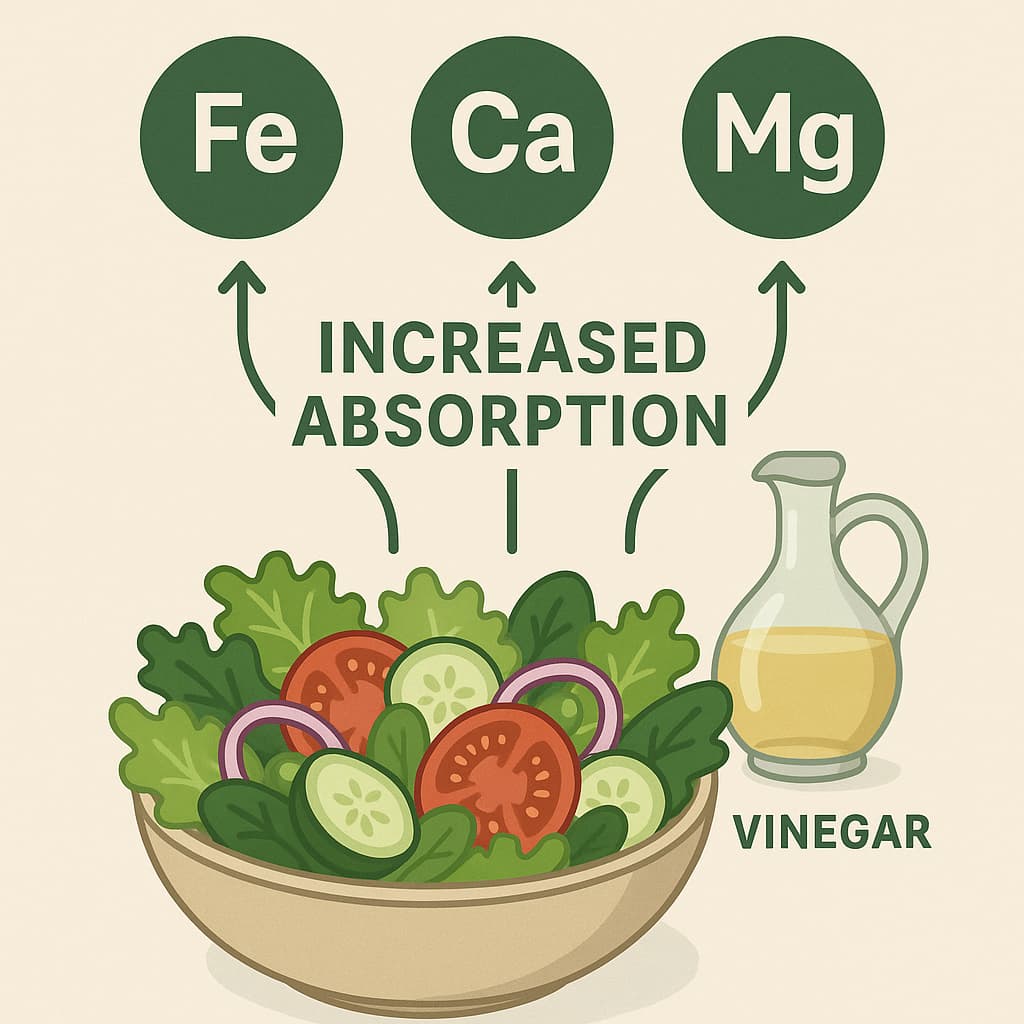
The mild acidity of vinegar enhances absorption of minerals such as calcium, magnesium, and iron from plant-based foods.
Adding vinegar to salads, beans, or leafy greens can increase bioavailability of these nutrients, especially for those following vegetarian or vegan diets.
Pro tip:
Use lemon or apple-cider vinegar as a salad dressing to improve iron uptake from spinach, lentils, and other non-heme sources.
The National Institutes of Health (NIH) notes that acidic ingredients can boost absorption of iron when paired with plant foods.
8. Supports Antimicrobial and Food Safety Functions
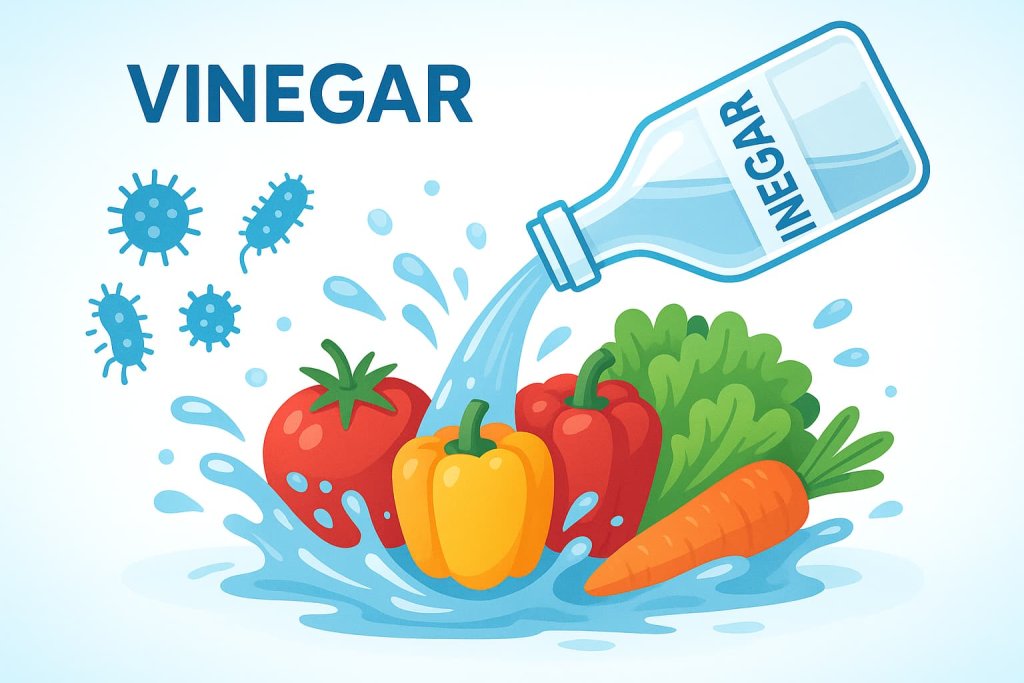
Vinegar’s natural acidity may help inhibit the growth of harmful bacteria such as E. coli and Salmonella, which is why it has been used for centuries in food preservation and pickling. Modern food safety experts confirm that vinegar-based rinses can reduce microbial load on fresh produce — but they should always complement, not replace, standard washing practices.
According to the U.S. Food and Drug Administration (FDA), the most effective way to reduce bacteria and pesticide residues on fruits and vegetables is by thoroughly rinsing under clean, running water, with gentle rubbing to remove dirt and surface microbes. While vinegar-water mixtures may add an extra layer of cleaning support, they are not a substitute for proper hygiene or cooking.
Practical use:
- Mix 1 part vinegar with 3 parts water to rinse fruits and vegetables, then follow with a fresh-water rinse.
- Use food-grade vinegar only, and avoid soaking produce for long periods.
- Do not rely solely on vinegar for disinfection — standard washing and safe handling remain essential steps.
This approach aligns with FDA food safety guidance, which emphasizes that vinegar rinses can support, but not replace, approved sanitation methods.
9. May Benefit Skin and Hair (Topical Use with Caution)

When properly diluted, vinegar may help support the skin’s natural pH balance and gently remove scalp buildup, thanks to its mild acidity and antimicrobial properties. Many people use diluted apple cider vinegar as a natural rinse or toner, but experts caution that it must always be used carefully and should never replace dermatologist-recommended treatments.
According to the Cleveland Clinic, while vinegar may have surface-cleansing benefits, undiluted vinegar can irritate or burn the skin and worsen conditions such as eczema, acne, or dryness. Dermatologists recommend using it only in diluted form and limiting frequency to avoid skin barrier damage.
Safe use tips:
- Always dilute: Mix one part vinegar with three to four parts water before applying to skin or scalp.
- Short contact only: Use briefly as a rinse or toner; avoid eyes, open wounds, and sensitive areas.
- Patch-test first: Apply to a small area and wait 24–48 hours to check for irritation.
- Stop use immediately if redness, stinging, or burning occurs.
Experts at the Cleveland Clinic emphasize that even diluted vinegar can cause irritation for some individuals and should not be viewed as a treatment for medical skin conditions.
In summary, vinegar may help maintain scalp and skin balance when used sparingly and correctly diluted. However, it should always complement — not replace — dermatologist-approved skincare and haircare practices.
10. May Support Immune Function

Emerging research suggests that vinegar’s antioxidants and acetic acid may indirectly support immune balance by nurturing gut health and lowering oxidative stress.
Because much of the immune system resides in the gastrointestinal tract, a balanced microbiome plays a vital role in overall defense.
Experts at the National Institute of Allergy and Infectious Diseases (NIAID) explain that diverse gut bacteria support healthy immune responses — an area where vinegar’s prebiotic effects show promise.
Possible Side Effects and Precautions

While vinegar can offer valuable health benefits, overuse or improper consumption can lead to side effects. Because it is acidic, vinegar should always be consumed in moderation and diluted to protect your teeth, throat, and digestive tract.
Common side effects and cautions:
- Tooth enamel erosion: The acetic acid in vinegar can weaken enamel over time if consumed undiluted. Always dilute it in water or use it in meals.
- Digestive irritation: Drinking vinegar on an empty stomach or in large amounts may cause nausea, throat irritation, or acid reflux.
- Medication interactions: Vinegar may interfere with insulin, diuretics, and potassium-regulating drugs, potentially lowering potassium levels or affecting blood sugar control.
- Pre-existing conditions: Individuals with ulcers, gastroesophageal reflux disease (GERD), kidney disease, or chronic digestive issues should consult a healthcare provider before adding vinegar to their diet.
The Mayo Clinic emphasizes that while vinegar may support wellness goals, it should not be considered a treatment for any health condition or a replacement for prescribed medication.
Key takeaway:
Use vinegar as a food complement, not a daily supplement. Always practice moderation and consult your doctor if you have existing health concerns or take regular medications.
How to Use Vinegar Safely
Incorporating vinegar into your diet is easy — but how you use it determines whether it’s helpful or harmful.
Following safe preparation and moderation guidelines ensures you enjoy its benefits without side effects.
Practical tips for safe use:
- Ideal serving: 1–2 tablespoons (15–30 mL) per day, diluted in at least one cup of water or used in salad dressings, marinades, or sauces.
- Best forms: Choose natural vinegars such as apple cider, rice, or balsamic vinegar with “the mother” (unfiltered, containing beneficial enzymes). Avoid heavily processed or sweetened versions.
- Avoid undiluted vinegar: Drinking vinegar straight can damage teeth and irritate the esophagus.
- Timing: Using vinegar before or during meals may help with digestion and post-meal glucose balance.
- Storage: Keep vinegar in a cool, dark place, tightly sealed, to preserve acidity and flavor.
According to Harvard Health Publishing, moderate vinegar use is generally safe for healthy adults when diluted properly and paired with a balanced diet.
Frequently Asked Questions (FAQs)
1. Is vinegar safe to drink daily?
Yes — when diluted (1–2 tablespoons in water) and used occasionally with meals. Avoid overconsumption or undiluted use to prevent throat irritation or enamel erosion.
2. Which vinegar is best for health?
Apple cider vinegar with “the mother” is most studied for metabolic health, but rice, balsamic, and red wine vinegars also offer antioxidants and flavor benefits.
3. Can vinegar replace medication for diabetes or cholesterol?
No. While vinegar may help regulate blood sugar and support heart health, it cannot replace prescription medications or medical supervision.
4. Does vinegar help with weight loss or digestion?
It may modestly support weight management and digestion by improving satiety and nutrient absorption, but results are mild and work best alongside a balanced diet and exercise.
5. How should vinegar be stored for freshness?
Keep it sealed in a cool, dry place away from sunlight. Refrigeration is unnecessary but helps extend quality, especially for fruit-based vinegars.
6. Can vinegar be used for cleaning produce?
Yes — diluted vinegar solutions (1 part vinegar to 3 parts water) may reduce surface bacteria, but they do not replace washing with running water as advised by the FDA.
7. Who should avoid vinegar?
People with acid reflux, ulcers, or chronic kidney conditions should limit vinegar intake and consult a healthcare professional before use.
Conclusion
Vinegar is a versatile and time-tested ingredient that offers multiple science-supported benefits — from supporting healthy blood sugar and digestion to improving heart wellness and nutrient absorption. When used wisely and moderately, it can enhance both flavor and health.
Always choose natural vinegars, dilute before drinking, and pair with balanced nutrition for long-term wellness. Those with chronic conditions or on medication should seek medical guidance before increasing vinegar intake.
Vinegar supports wellness — but moderation, dilution, and proper use are key.
This content is for informational purposes only and not medical advice.
References
- Harvard Health Publishing – Does Apple Cider Vinegar Have Any Proven Health Benefits?
Overview of scientific evidence on vinegar’s effects on blood sugar, weight, and metabolism — includes dosage and safety guidance. - Mayo Clinic – Apple Cider Vinegar for Weight Loss (FAQ)
Medical review on vinegar’s potential role in weight management and related side effects or drug interactions. - American Heart Association – What Can Apple Cider Vinegar Really Do for Your Health?
Evidence-based discussion on heart health, cholesterol, and blood-pressure claims linked to vinegar. - Harvard T.H. Chan School of Public Health – Vinegar (The Nutrition Source)
Comprehensive nutrition profile of vinegar types, production process, and scientifically supported benefits. - U.S. Food and Drug Administration – Selecting and Serving Produce Safely
FDA guidance confirming proper washing methods for fruits and vegetables and clarifying vinegar’s limited antimicrobial role.
